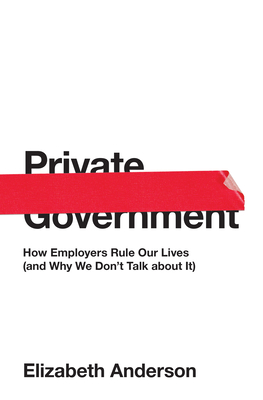

 Princeton University Press
Princeton University Press
Private Government: How Employers Rule Our Lives (and Why We Don't Talk about It)


Key Metrics
- Elizabeth Anderson
- Princeton University Press
- Hardcover
- 9780691176512
- 8.6 X 5.7 X 1 inches
- 0.9 pounds
- Philosophy > Political
- English
 Secure Transaction
Secure TransactionBook Description
Why our workplaces are authoritarian private governments--and why we can't see it
One in four American workers says their workplace is a dictatorship. Yet that number probably would be even higher if we recognized most employers for what they are--private governments with sweeping authoritarian power over our lives, on duty and off. We normally think of government as something only the state does, yet many of us are governed far more--and far more obtrusively--by the private government of the workplace. In this provocative and compelling book, Elizabeth Anderson argues that the failure to see this stems from long-standing confusions. These confusions explain why, despite all evidence to the contrary, we still talk as if free markets make workers free--and why so many employers advocate less government even while they act as dictators in their businesses.
In many workplaces, employers minutely regulate workers' speech, clothing, and manners, leaving them with little privacy and few other rights. And employers often extend their authority to workers' off-duty lives. Workers can be fired for their political speech, recreational activities, diet, and almost anything else employers care to govern. Yet we continue to talk as if early advocates of market society--from John Locke and Adam Smith to Thomas Paine and Abraham Lincoln--were right when they argued that it would free workers from oppressive authorities. That dream was shattered by the Industrial Revolution, but the myth endures.
Private Government offers a better way to talk about the workplace, opening up space for discovering how workers can enjoy real freedom.
Based on the prestigious Tanner Lectures delivered at Princeton University's Center for Human Values, Private Government is edited and introduced by Stephen Macedo and includes commentary by cultural critic David Bromwich, economist Tyler Cowen, historian Ann Hughes, and philosopher Niko Kolodny.
Author Bio
Professor Elizabeth Anderson specializes in moral, social and political philosophy, feminist theory, social epistemology, and the philosophy of economics and the social sciences. She is particularly interested in exploring the interactions of social science with moral and political theory, how we learn to improve our value judgments, the epistemic functions of emotions and democratic deliberation, and issues of race, gender, and equality.
She is the author of Value in Ethics and Economics, The Imperative of Integration, and, most recently, Private Government: How Employers Rule Our Lives (And Why We Don't Talk About It), as well as articles on value theory, the ethical limitations of markets, facts and values in social scientific research, feminist and social epistemology, racial integration and affirmative action, rational choice and social norms, democratic theory, egalitarianism, and the history of ethics (focusing on Kant, Mill, and Dewey). Professor Anderson is currently working on a history of egalitarianism.
Professor Anderson is a MacArthur Fellow, a Fellow of the American Academy of Arts and Sciences, and a Fellow of the British Academy. She designed and was the first Director of the Program in Philosophy, Politics, and Economics at UM.
- Education
- 1987, Ph.D., Philosophy, Harvard University
1984, A.M., Philosophy, Harvard University
1981, B.A., Philosophy with minor in Economics, High Honors, Swarthmore College
Source: University of Michigan
Videos






Community reviews
Write a ReviewNo Community reviews